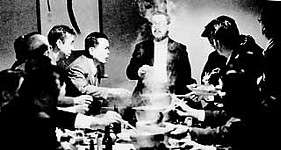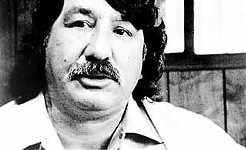Rhapsody in August
1991 Directed by Akira Kurosawa. Starring Sachiko Murase, Richard Gere.
REVIEWED By Kathleen Maher, Fri., March 27, 1992
Kurosawa's lovely meditation on the nature of American-Japanese relations could not come at a better time. While casting about for villains this election year, the present administration has hit upon the Japanese. In spite of this, Kurosawa is generous in his attitude toward the Americans in this film about the post-bomb generation in Japan. Kurosawa uses three generations -- four children, their parents and the children's grandmother -- to represent the Japanese people. The children have come to stay with their grandmother who lives in a beautiful house in the mountains above Nagasaki, while their parents have gone to visit a long lost uncle in Hawaii. The uncle's son is wealthy, debonair, half-Japanese, all American and played by Richard Gere. The kids, sweet and mischevious, can barely contain their desire to visit Hawaii themselves. But their grandmother isn't so sure. Thinking back, she remembers the day the bomb fell, the day her husband died and when the tangled paths of her family changed forever. For the kids, this becomes an opportunity to learn more about Nagasaki's past and about their grandmother. Kurosawa's visit with this family is a lovely idyll and the wonderful old woman's relationship with her grandchildren is the best part of the film. Shortly after the kids' parents return from Hawaii, Gere, as the newfound cousin, comes to visit and, gradually, the relationship between Japan and America is revealed as something much more complicated than a matter of understanding and forgiveness. The parents, so happy to find a rich relative and so hopeful that some of this wealth will come their way, are terrified of offending him. But he comes to pay his respects to his family and to see the place his uncle died. As lovely as Rhapsody in August is, it is also disappointing. The privileged view of the grandmother and her grandchildren and their interactions is fully realized, if a bit one-dimensional, but once the parents arrive on the scene, the film loses its focus. It's probably because the parents, as representatives of modern Japan, have so much to say and so much to work out, but not much of that really makes it to the screen. By the end of the film, there is no reconciliation or even acceptance, only a confused feeling of sadness and loss.
A note to readers: Bold and uncensored, The Austin Chronicle has been Austin’s independent news source for over 40 years, expressing the community’s political and environmental concerns and supporting its active cultural scene. Now more than ever, we need your support to continue supplying Austin with independent, free press. If real news is important to you, please consider making a donation of $5, $10 or whatever you can afford, to help keep our journalism on stands.
Marjorie Baumgarten, Dec. 7, 2000
Marc Savlov, Dec. 1, 2000
July 10, 1992
Rhapsody in August, Akira Kurosawa, Sachiko Murase, Richard Gere









